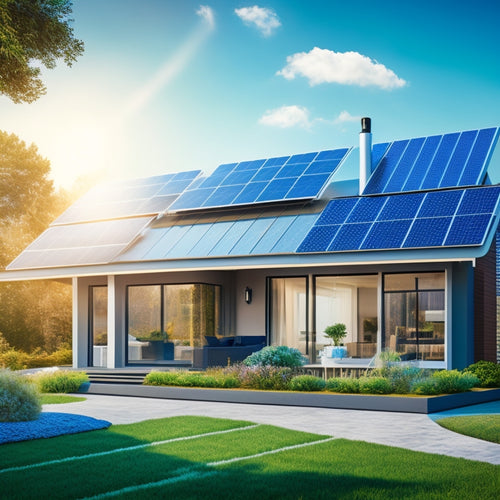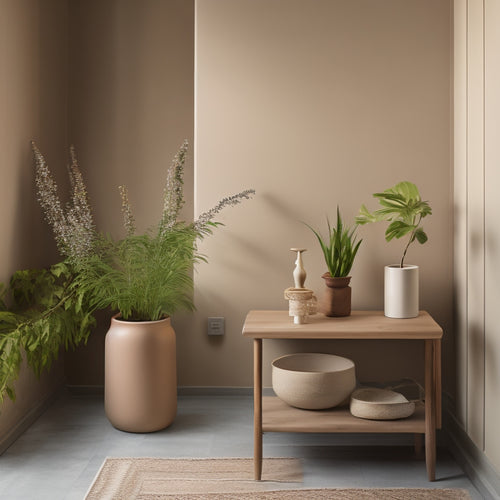
Smart Plugs: Track and Optimize Your Appliance Energy Usage
Share
You can take control of your energy usage and reduce your carbon footprint with smart plugs, which connect to Wi-Fi and track real-time power consumption of your appliances. These advanced sensors provide detailed data to identify inefficiencies, allowing you to make informed decisions to optimize energy consumption. By eliminating standby power consumption and identifying high-energy devices, you can save on energy bills and reduce energy waste. With the right smart plug, you can even schedule appliances to turn off during inactivity and set maintenance prompts to guarantee they operate efficiently. Now, find out how to choose the perfect plug and access even more energy-saving opportunities.
Key Takeaways
- Smart plugs track real-time energy usage, providing detailed data to identify inefficiencies and optimize energy consumption.
- Energy monitoring helps reduce energy waste, lower carbon footprint, and save on energy bills.
- Choose a smart plug compatible with your devices, Wi-Fi network, and smart assistants for seamless integration.
- Implement scheduling and automation features to minimize standby consumption and optimize appliance energy use.
- Smart plugs can integrate with renewable energy sources, enabling a more sustainable and energy-independent future.
How Smart Plugs Work
Efficiency converges with innovation in smart plugs, which have revolutionized the way you manage energy consumption.
These devices employ smart plug technology to track and control the energy consumption of your appliances. By optimizing your energy usage, you can reduce your carbon footprint and lower your energy bills, much like optimizing a solar panel array's design and orientation can enhance energy production.
You can learn more about solar panel array design to maximize your energy harvesting. You simply plug your devices into the smart plug, and it connects to your Wi-Fi network, allowing you to monitor their energy usage remotely.
The smart plug's advanced sensors track the appliance's power consumption in real-time, providing you with detailed data on your energy usage. This information enables you to identify areas of inefficiency and make informed decisions to reduce your energy consumption.
Benefits of Energy Monitoring
Your energy usage snapshot, provided by smart plug technology, reveals a wealth of benefits.
With real-time data at your fingertips, you can make informed decisions to optimize your energy consumption and reduce waste. This enablement leads to tangible advantages, including:
- Cost savings: Identify and eliminate standby power consumption, reducing your energy bills and saving you money.
By leveraging fast charging infrastructure, you can also reduce your reliance on traditional power sources and lower operational costs.
- Environmental impact: By reducing your energy waste, you'll lower your carbon footprint and contribute to a more sustainable future.
Implementing solar-powered charging solutions can further decrease your carbon emissions and promote energy independence.
-
Appliance optimization: Learn which devices are using the most energy and adjust their usage to maximize efficiency.
-
Increased convenience: Receive notifications when devices are left on, ensuring you never waste energy again.
Choosing the Right Plug
When it comes to utilizing the benefits of smart plug technology, selecting the right plug is essential. You'll want to take into account factors like compatibility, power rating, and features.
| Plug Type | Compatibility | Power Rating |
|---|---|---|
| Wi-Fi Plug | iOS, Android | 15A, 1800W |
| Smart Plug with Energy Monitoring | iOS, Android | 15A, 1800W |
| Outdoor Smart Plug | iOS, Android | 15A, 1800W |
For installation, make sure you follow the manufacturer's instructions and consider the plug's maximum power rating. Additionally, take into account the type of appliances you'll be plugging in and choose a plug that supports their power requirements. By choosing the right plug, you'll be able to accurately track and optimize your appliance energy usage, giving you more control over your energy consumption and costs.
Optimizing Appliance Energy Use
With smart plug technology in place, you can now focus on optimizing your appliance energy use. This is where the real benefits of smart plugs come into play. By gaining understanding into your energy usage, you can identify areas for improvement and make data-driven decisions to reduce your energy consumption.
For instance, you can apply time-of-use rate strategies Time-of-Use Rate Optimization to charge your appliances during off-peak hours, resulting in significant cost savings. Additionally, you can implement load management strategies to avoid peak charges, which can account for up to 70% of electricity bills.
- Schedule your appliances to turn off during periods of inactivity to avoid standby power consumption
- Identify energy-hungry appliances and consider replacing them with more efficient alternatives
- Use the smart plug's automation features to turn off lights and other devices when not in use
- Set prompts to perform routine maintenance on your appliances to guarantee they're running efficiently
Smart Plug Compatibility Matters
Smart plug technology's ability to optimize appliance energy use is only as good as its compatibility with your devices. You need to confirm the smart plug you choose is compatible with your appliances, lights, and other devices.
Check if the smart plug supports your device's voltage, wattage, and frequency requirements. Additionally, integrating renewable energy sources, such as solar energy, can further reduce your carbon footprint and enhance energy independence.
Also, consider smart home integration - can the smart plug seamlessly integrate with your existing smart home system? Device compatibility is essential, so verify that the smart plug is compatible with your Wi-Fi network and devices like Amazon Alexa or Google Assistant.
Frequently Asked Questions
Can I Use Smart Plugs With Appliances That Have Built-In Timers?
You can use smart plugs with appliances having built-in timers, but you'll need to guarantee the smart plug benefits, like scheduling and energy monitoring, don't conflict with the appliance's timer; check compatibility before setting up to avoid any issues.
Will Smart Plugs Work With My Old, Non-Smart Home Devices?
You'll be pleased to know that smart plugs are compatible with most of your old, non-smart home devices, allowing you to tap into energy monitoring features and optimize their usage, giving you more control over your energy consumption.
Are Smart Plugs Compatible With Appliances Using 220V Power?
When you're considering voltage compatibility, you'll find that most smart plugs only support 110/120v power, so you'll need to verify the plug's specifications to guarantee appliance safety with your 220v devices, or opt for a specialized 220v-compatible smart plug.
Can I Control Multiple Smart Plugs With a Single Account?
Instead of juggling multiple accounts, you'll relish the freedom to control multiple smart plugs with a single account, effortlessly managing your smart plug fleet and streamlining energy monitoring for a more efficient you.
Do Smart Plugs Affect Wi-Fi Network Performance or Speed?
You're wondering if smart plugs will slow down your Wi-Fi network. Generally, they won't greatly impact your signal strength, but they can cause minor Wi-Fi interference, especially if you have a lot of devices connected to the same network.
Related Posts
-

7 Best Cool Roof Rebates for Energy-Savvy Homeowners
You're an energy-savvy homeowner looking to install a cool roof, and you're wondering which rebates can help you save...
-

What Are Natural Clay Paints for Green Home Interiors?
You're about to uncover a game-changing alternative to synthetic paints that not only enhances the aesthetic of your ...
-

7 Blockchain Tools for Home Energy Management
You can utilize blockchain technology to optimize your home's energy management through innovative solutions like blo...


